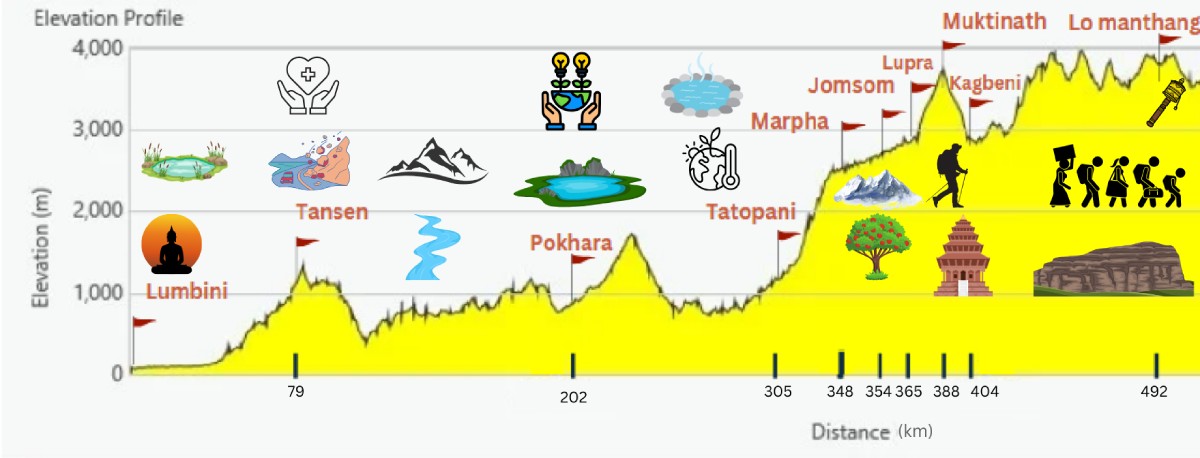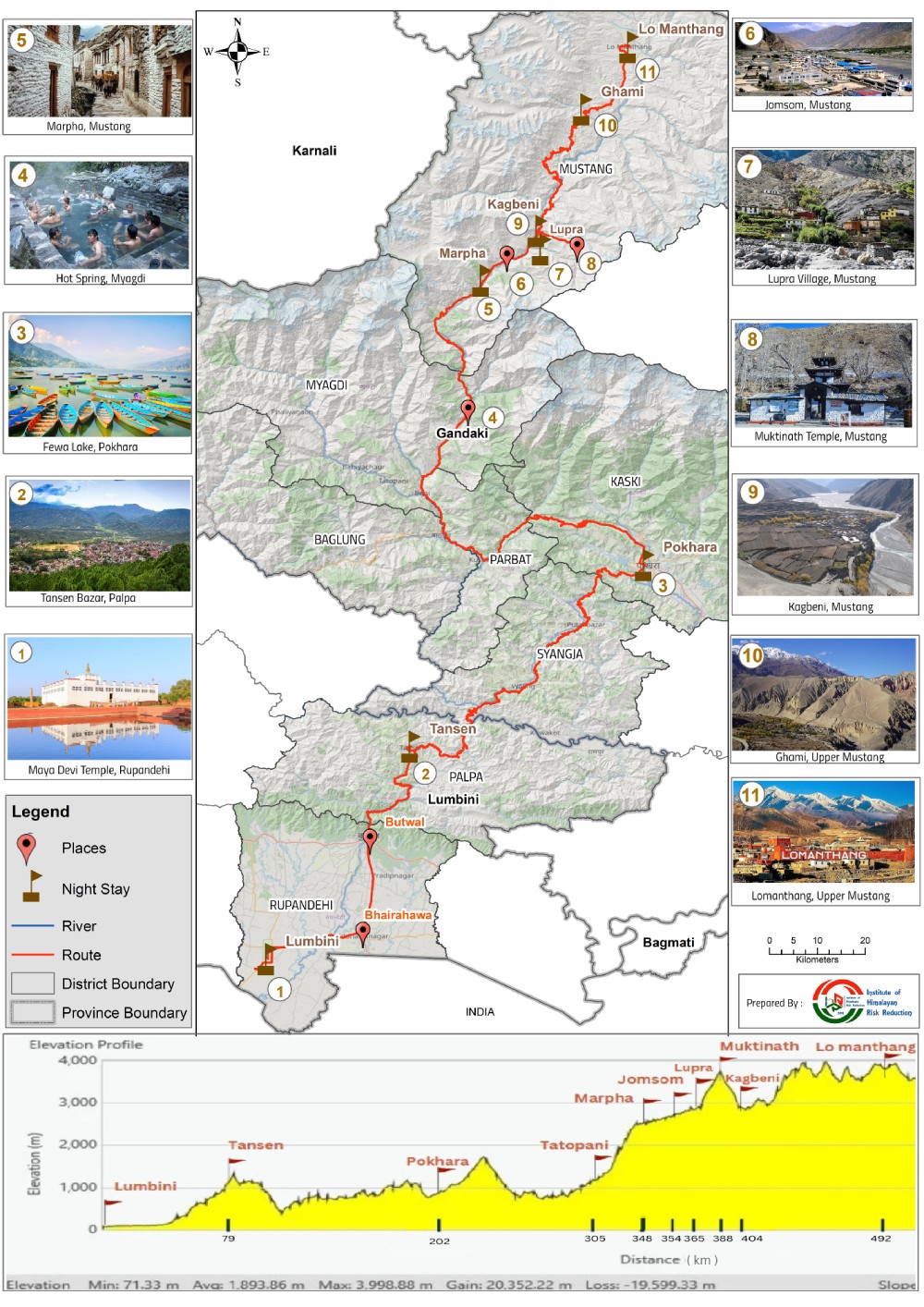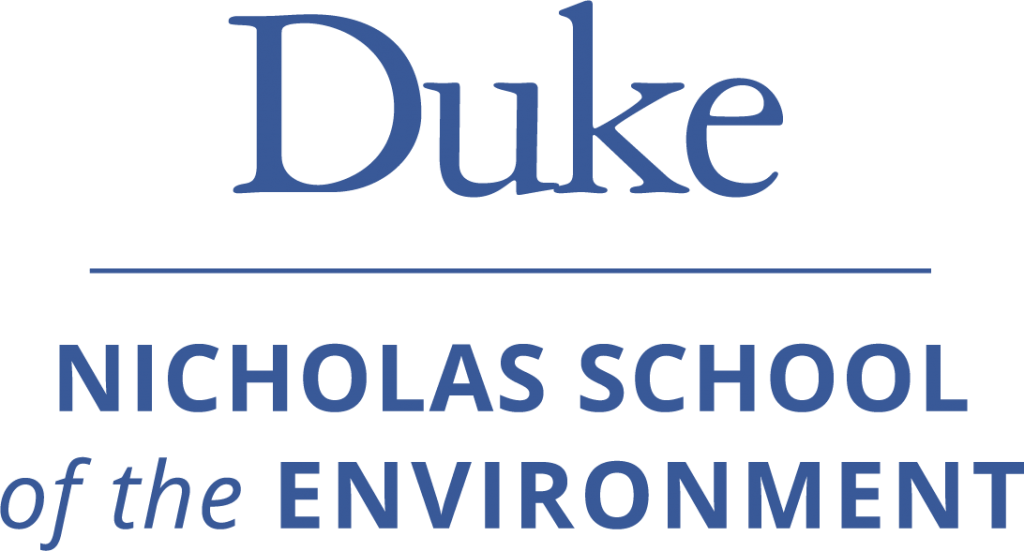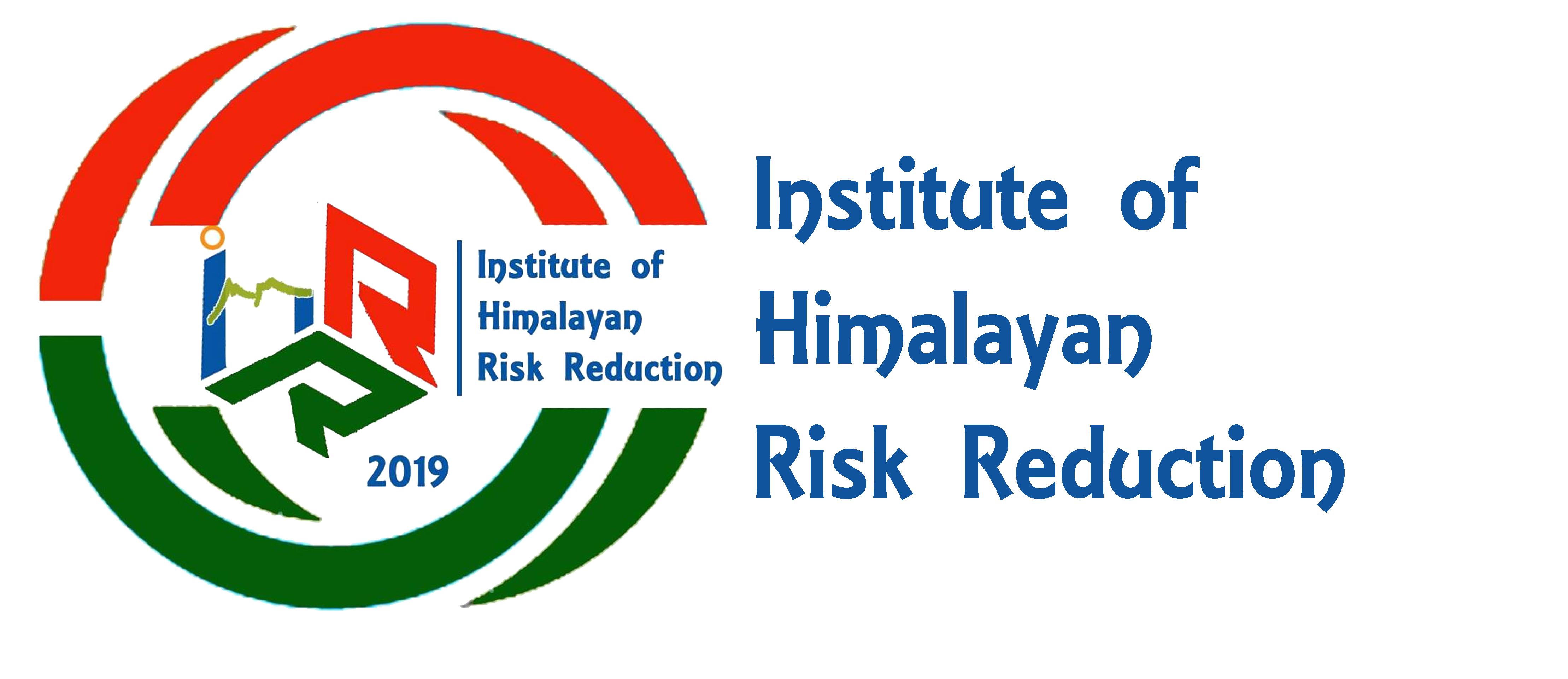About the event
The 2025 Fieldschool, titled Lumbini to Lo Manthang (L2L): Planetary health across the Himalaya caters to a diverse group of undergraduate students from environment, engineering, the humanities and health of Duke University, Duke Kushan, and member universities of the HUC aiming to examine how global change is impacting human health and well-being. The fieldschool highlights the critical need for this diverse set of stakeholders – students, faculty members and policymakers – to understand the acute impacts of climate change on health and environmental and socio-economic well-being and the diverse climate zones of Nepal provide an excellent natural laboratory.

The three-week field-based programme will begin in the Terai region (100 above sea level) and end at the Tibetan Plateau (4,000 masl), involve two domestic flights, many hours on coaches and in Jeeps, with an average 2-4hour field visit each day. The starting point of the journey is Lumbini, the birthplace of The Buddha, in the hot, flood-prone Terai to participate in a NGO- run health camp near the epicenter of the 2015 Gorkha earthquake (1,000 masl), then take a new road into the heart of the Himalaya to learn how global change is impacting biodiversity in this home of blue sheep, pallas cats and the elusive snow leopard (3,500 masl). Students and faculty members will then trek to a storied Hindu pilgrimage site (3,800 masl) and ending at the Tibetan Plateau in the rainshadow of the Annapurna range where 3,000 year old villages (Dhye and Sam Dzong) are being relocated due to climate change. At each stop, fieldschool members will examine climate data, meet with local officials and gain insights from Nepali and foreign researchers and experts on the nexus of global change (climate + land use/land cover), development and human health and well-being. Fieldschool participants will also learn how locals are navigating more sustainable solutions to their challenges in the Planetary Health framework.
Objectives
Each stop along the Climate & Health+ transect will consider how global change is impacting the health and well-being of communities in these broad geographic regions. Students in the first iteration will help us design a course where participants will be better equipped to
- Understand the complex interactions between communities and environmental changes in geology, water resources, atmosphere and biodiversity.
- What are the factors that contribute to climate disaster risk and response, and how this understanding informs more sustainable solutions for resilience building.
- How the environmental determinants of health and well-being can be attributed to the various aspects of these rapidly changing systems.
- Document examples of sustainable land restoration practices that support the natural systems that provide much-needed ecosystem services to communities.
- Better understand the trends around development, human migration, tourism, urbanization, transportation and food systems.
- How Indigenous knowledge, religion and ethnicity impact people’s understanding of disasters and how these views impact sustainable solutions.
- Engaging with community stakeholders including youth groups, women’s groups, religious leaders, business leaders/entrepreneurs, politicians and policymakers.

Expected outcomes
- Participants’ first-hand field-based experience and knowledge of the intricate interdependency and complex interactions between communities and environmental changes in geology, water resources, atmosphere and biodiversity, environmental determinants of health and well-being, factors that contribute to climate disaster risk and response, and how Indigenous knowledge, religion and ethnicity impact people’s understanding of risks.
- Participants’ firm grasp of key concepts and methods of stakeholder engagement, documentation, and storytelling as part of the co-production of knowledge and co- design of sustainable solutions in land restoration practices, natural and cultural heritage conservation, and climate resilience building.
Expected participants
Participants are 18 undergraduate students, enrolled from Duke University and Duke Kunshan (DKU) Environment, Engineering and Global Health, Yunnan University (China), and Nepal-based institutions. Faculty members from Duke and its partners, HUC members (Himalayan Institute for Alternative, Ladakh), and Nepal’s hosting institutions, the Institute of Himalayan Risk Reduction, Forum for Energy and Environment Development, National Trust for Nature Conservation (NTNC), and Varagung Muktichhetra Rural Municipality (VMRM). Invited speakers come from various institutions in Nepal, especially in the localities along the fieldschool’s route, and the International Centre for Intergrated Mountain Development (ICIMOD).
Background
The Hindu Kush Himalaya (HKH) region, known also as the Third Pole, is one of the largest mountain systems in the world, extending from Hindu Kush in Afghanistan to hills and mountain systems of Myanmar. With 18.23% of its landmass under snow cover, the HKH has the largest reserves of ice outside the polar regions. The HKH region is home to 240 million people, with a further 1.65 billion people that reside along the river valley downstream. The region provides significant economic benefits to the 8 regional member countries (RMCs), through ecosystem services and livelihood opportunities. Its potential to bring prosperity and address sustainable development goals (SDGs) is very high.
However, the HKH region is facing major sustainability challenges from socio-economic and climate change impacts. To the vulnerable stakeholders (local communities, government, business and service providers), the impacts are real and devastating. The long-term impacts of such challenges are not only overheating atmosphere beyond 1.5 degree, but are also undermining development progress and exacerbating climate injustice. There’s an urgent need for global-regional-local collaboration to restore and protect ecosystems and services, alongside safeguarding biodiversity and mountain economy, along with enhancing the capacity of the stakeholders to respond to risks. However, there’s a huge gap in terms of understanding the emerging risks and availability of the relevant knowledge to take climate actions.
The Himalayan University Consortium Student Mobility and Faculty Exchange (SMFE) Task Force was established in April 2024 and met in the Royal Thimphu College, Thimphu, in November 2024. A Concept Note on Eco-Leadership Field School (ELFS): Advancing Resilient Practices in the HKH was endorsed by the HUC Steering Committee at its e- meeting in December 2024. The primary objective of ELFS is to empower local leaders, youth, and professionals with the knowledge and skills to implement environmentally responsive practices and policies, ensuring the ecological and social resilience of the HKH region. The ELFS has the following specific objectives:
- Exposure to critical Planetary issues
- Bridging technical knowledge with human experience
- Encourage interdisciplinary exchange
- Forster mutual respect and understanding, and
- Address climate change impacts
The ELFS is structured to provide dynamic, hands-on, and interdisciplinary learning experience. It will collaborate with universities and research institutes within each field school host country to ensure alignment with local expertise, scientific resources, and academic network. EFLS will be hosted in rotating locations across selected transects within the HKH region, enabling participants to explore diverse ecosystems, cultural practices, and climate challenges.
About the organisers
Duke University is the premier institution that integrates environmental science, engineering and health (along with policy, business, law and even divinity) to address the problems associated with complex global changes. The topographic, climatic, ecologic, economic and cultural diversity of Nepal offers a singular living laboratory for students from Duke and the Himalayan region to see these intersections in all real-world messiness. Under the auspices of Duke’s Climate Commitment, a Climate & Health+ project aims to benefit Environment and Global Health students at Duke and Duke Kunshan, as well as students of public policy, engineering, and biology and pre-med students from across various majors of these institutions.
Forum for Energy and Environment Development (FEED) P. Ltd. is one of the leading consulting companies in Nepal initiated by the Engineers’ and development planners’ with a vision of providing the best research and consulting services in developing the risk- informed societies. FEED is driven by strong and diverse professionals with proven expertise and experience in handling large and complex projects across sectors.
A Research Institute established with an objective of assessing and understanding the risk to contribute to sustainability. Complying with the Sendai Framework for Disaster Risk Reduction (SFDRR), the Institute of Himalayan Risk Reduction envisions understanding the risk and application of interdisciplinary knowledge with technologies to contribute to risk reduction and bridging between academic research with professionals and policymakers for sustainability. Team IHRR believes in coupling the enthusiasm and ambition of youth, with its lack of fear and innovative techniques, with the gardened knowledge of experience to work for the change. The team consists of professionals with expertise and experiences in the field of disaster risk management in understanding the risk, conducting academic research, and field-level implementations in Nepal and different parts of the world.
The Himalayan University Consortium (HUC) is a network of universities, research institutions, and researchers and scholars in the Hindu Kush Himalayas (HKH) and outside the region. The HUC’s mandates are to enable regional academic collaboration and nurture generations of scholar-leaders for sustainable mountain futures. The Consortium works to strengthen the connection between knowledge-generating and decision-making institutions, creating new opportunities for inter- and trans-disciplinary and transboundary research collaboration and enhancing mountain-specific research.






